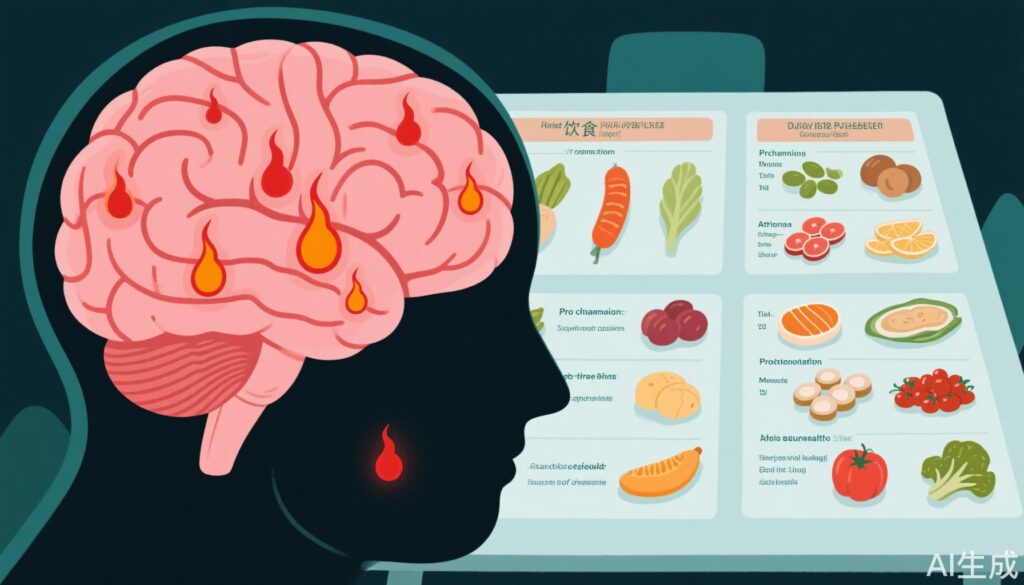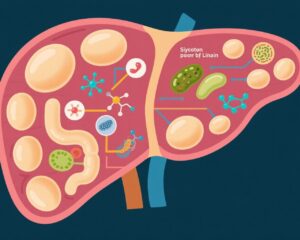Highlight
- Dietary inflammation, quantified by the Dietary Inflammatory Index (DII), is positively associated with future risk of depression and anxiety.
- This large prospective cohort study from UK Biobank followed nearly 190,000 individuals over a median of 14.1 years.
- Higher DII scores increased the odds and hazards of both mood symptoms and clinically diagnosed depressive and anxiety disorders, independent of confounders.
- An anti-inflammatory dietary approach guided by DII evaluation may offer a viable strategy for mental health risk reduction.
Study Background and Disease Burden
Depression and anxiety disorders are leading causes of global disability and impose substantial individual and public health burdens. Despite advances in pharmacotherapy and psychotherapy, prevention remains crucial given high recurrence rates and incomplete treatment responses. Emerging evidence implicates systemic inflammation as a biological pathway in the etiology of these mood disorders. Diet, a modifiable lifestyle factor, influences systemic inflammation through its composition of pro- and anti-inflammatory nutrients and foods. The Dietary Inflammatory Index (DII) was developed to quantify the overall inflammatory potential of diets. Understanding how dietary inflammatory profiles impact the development of depression and anxiety could inform population-level interventions and clinical dietary guidance.
Study Design
This prospective cohort study utilized data from the UK Biobank, encompassing 189,835 participants with baseline dietary data collected via a 24-hour dietary recall questionnaire that included 29 relevant food items used to compute the DII. Participants were initially free of depression and anxiety disorders per hospital records. The study identified depression and anxiety disorders using International Classification of Diseases (ICD) codes obtained from hospital admission records. Additionally, depressive and anxiety symptoms were assessed through validated patient-reported instruments: the Patient Health Questionnaire-9 (PHQ-9) and the Generalized Anxiety Disorder-7 (GAD-7) questionnaires. Cox proportional hazards models and logistic regression analyses were applied to estimate the associations of baseline DII scores with subsequent incident mood disorders and symptom prevalence, adjusting for sociodemographic characteristics, lifestyle factors, and existing medical conditions. The median follow-up duration was 14.1 years.
Key Findings
During follow-up, the incidence rates for depression and anxiety disorders were 257.25 and 272.10 per 100,000 person-years, respectively. The mean DII was -0.435, ranging from -6.566 (highly anti-inflammatory diet) to +5.449 (highly pro-inflammatory diet). After multivariable adjustment, higher DII scores were significantly associated with increased risk of both depressive and anxiety outcomes:
- Depressive mood symptoms: odds ratio (OR) 1.137 (95% CI, 1.111–1.162), P < 0.001.
- Depression disorders (diagnosed by ICD codes): hazard ratio (HR) 1.063 (95% CI, 1.046–1.082), P < 0.001.
- Anxiety mood symptoms: OR 1.094 (95% CI, 1.079–1.108), P < 0.001.
- Anxiety disorders: HR 1.023 (95% CI, 1.007–1.040), P < 0.001.
These associations persisted after controlling for potential confounders including age, sex, socioeconomic status, smoking, physical activity, body mass index, and comorbid medical conditions, supporting an independent relationship between dietary inflammation and mental health outcomes.
Expert Commentary
This robust longitudinal analysis reinforces the hypothesized role of inflammation as a mechanistic link between dietary patterns and mood disorders. By leveraging a well-characterized large cohort with comprehensive follow-up and standardized diagnostic coding, the study addresses previous limitations of smaller, cross-sectional investigations. The DII aggregates diverse dietary components, enhancing the utility over isolated nutrient analyses.
Nevertheless, causality cannot be definitively established due to potential residual confounding and the observational design. Self-reported dietary data and single time point measurement may introduce misclassification bias. The study population, predominantly of European descent, may limit generalizability to other ethnic groups.
Biologically, pro-inflammatory diets might promote neuroinflammation via cytokine-mediated pathways, oxidative stress, and microglial activation, processes linked to mood dysregulation. Conversely, anti-inflammatory diets rich in omega-3 fatty acids, antioxidants, fiber, and polyphenols could attenuate inflammatory cascades and support neuroplasticity.
Current clinical practice guidelines for depression and anxiety emphasize multifaceted approaches, including lifestyle modification. Incorporating dietary inflammation assessment and counseling could enhance prevention strategies. Future randomized trials are needed to test causation and intervention efficacy.
Conclusion
This large, prospective UK Biobank study establishes a significant association between pro-inflammatory dietary patterns, as measured by the Dietary Inflammatory Index, and elevated risk of both depression and anxiety symptoms and disorders. The findings underscore the potential of anti-inflammatory dietary approaches to contribute to mental health prevention and management. Clinicians should consider dietary inflammatory potential when advising patients, recognizing diet as a modifiable determinant of mental well-being. Continued research into mechanistic underpinnings, population-specific effects, and intervention trials is essential to translate these observational findings into practice.
References
1. Pang C, Yu H, Xie J, Chen Y, Cao W, Yu X, Zhu L, Zhang J, Gao L, Li Y, Du L, Deng B, Ji L. Pro-inflammatory diet and the risk of depression and anxiety: A prospective study based on the dietary inflammatory index. J Affect Disord. 2025 Oct 15;387:119533. doi: 10.1016/j.jad.2025.119533. Epub 2025 May 28. PMID: 40447150.
2. Shivappa N, Steck SE, Hurley TG, Hussey JR, Hébert JR. Designing and developing a literature-derived, population-based dietary inflammatory index. Public Health Nutr. 2014 Aug;17(8):1689-96. doi:10.1017/S1368980013002115.
3. Dowlati Y, Herrmann N, Swardfager W, et al. A meta-analysis of cytokines in major depression. Biol Psychiatry. 2010 Mar 1;67(5):446-57. doi:10.1016/j.biopsych.2009.09.033.
4. Jacka FN, O’Neil A, Opie R, et al. A randomised controlled trial of dietary improvement for adults with major depression (the ‘SMILES’ trial). BMC Med. 2017 Dec 12;15(1):23. doi:10.1186/s12916-017-0791-y.
5. Liu J, Liu S, Zhang B, et al. Dietary inflammatory index and risk of depression: A meta-analysis. Psychol Med. 2020 Sep;50(12):2153-2161. doi:10.1017/S0033291719003163.



